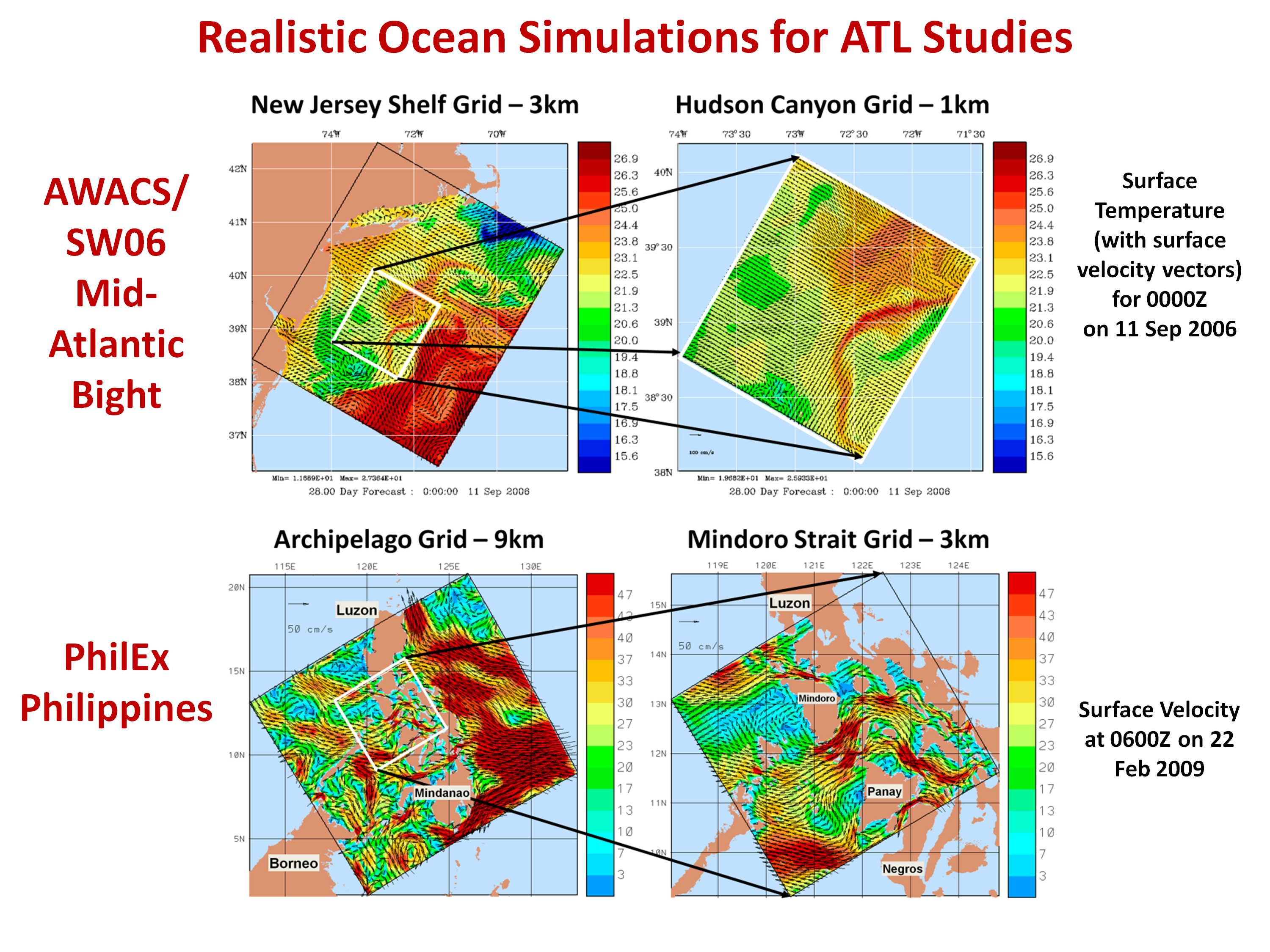Active Transfer Learning (ATL) for Ocean Modeling
|
P.F.J. Lermusiaux, P. Lu, M.P. Ueckermann, P.J. Haley, Jr., T. Lolla, W.G. Leslie, C. Mirabito Massachusetts Institute of Technology
|
Project Summary Ongoing MIT-MSEAS Research MSEAS ATL-supported Publications Additional ATL Links Background Information
|




|
| This research sponsored by the Office of Naval Research. | ||
Project Summary
The fundamentals of learning theory, decision theory and information theory (e.g. Duda et al., 2001; Sobcyk, 2001; Willsky and Wornell, 2004; Russell and Norvig, 2009; Golland et al., 2010) have not yet been formally utilized or applied much in ocean modeling and prediction, and not even in ocean science and technology in general. However, decision and learning procedures are frequently employed by most ocean scientists and modelers, even though they are not really cognizant of this. For example, in preparation for a real-time ocean exercise, scientists need to learn about the dynamics of the region, collect and analyze ocean measurements, select dynamical model parameters, and determine the numerical constraints and conditions. All of this work involves transfer learning from previous exercises or experiences. During the real-time exercise, operations often include a number of activities ranging from (on-line) routine tasks which are semi-automatic or require little human intervention to advanced (off-line) research activities and computations. In all of these activities, humans provide intermittent guidance to the algorithms, leading to active learning from multiple "Subject Matter Experts". This type of research is part of this Active Transfer Learning (ATL) for Ocean Modeling project.
Background information is available below.
| Top of page |
Ongoing MIT-MSEAS Research
Our main objective is to research ATL schemes and techniques to be applied to the modeling of ocean processes.
Goals:
- Research, apply and implement learning theory and principles to ocean modeling
- Develop idealized and realistic ocean modeling tests beds for ATL research
- Incubate new (machine) learning schemes based on the idealized set-ups and test the best ones in realistic simulations.
- Provide ocean data, simulations, software and methodology to the ATL project research teams
- Collaborate and transfer of expertise, approaches, algorithms and software to and from naval laboratories and centers.
Applications
There are three types of ATL learning applications and scenarios that we are researching using realistic ocean simulations and idealized simulations:
- ATL directly from ocean measurements (either simulated or real): learning science/processes from data alone
- ATL within realistic complex simulations (as complex as real-ocean)
- Science challenge: find new processes in these complex simulations
- Naval challenge: what are the keys for the Naval operator
- ATL from mismatch between models and measurements
Ocean Test Cases:
We have defined a set of ocean test cases for Active Transfer Learning. The test cases are intended to be not too simple but not too complicated, so that ideas can be generated and tested, and algorithms and methods evaluated, in fast but relevant enough situations.
Presentations and Meetings
All documents below are password protected.
Presentations
- Tutorial on Ocean Modeling with Active Transfer Learning Focus Presented on 7 January 2011 [PDF - 43MB]
- Active Transfer Learning for Ocean Process Modeling - Presented on 10 February 2011 [PDF - 3.2MB]
Meeting Notes
MSEAS ATL-supported Publications
| Top of page |
Additional ATL Links
| Top of page |
Background Information
The overall objective of this program is to conduct basic research that will help enable robust autonomy and automation in dynamic, unconstrained environments and contexts. The two science problems of interest are (i) how a learning machine may leverage all relevant prior knowledge; and, (ii) how it may leverage occasional in situ availability of a subject matter expert (SME). This leads naturally to the existing research of Transfer Learning and Active Learning. The intent of the ATL program is to improve upon these two existing areas of research and combine them to produce a novel, powerful learning capability. The primary deficiency of active learning is that it typically involves only labeling exemplars and does not allow the SME to fully impart his/her rich domain knowledge as they would to a human student. A deficiency of transfer learning is that when it fails it is typically not possible for an SME to repair or complete the transfer in situ. By exploiting both of these deficiencies, this ATL rogram seeks to fundamentally extend the scope of active learning and incorporate it into the knowledge transfer process. The two specific technical goals are to capitalize on the occasional availability of an SME to enable 1) the robust transfer of knowledge from existing sources and 2) the injection of new knowledge in situ. This first technical goal includes both machine-initiated and human-guided exploration of existing knowledge sources as well as machine-based reasoning on knowledge sufficiency for prompting SME queries. This second technical goal includes both machine-initiated queries of target knowledge as well as SME injection of new, rich domain knowledge into the target.
| Top of page |



